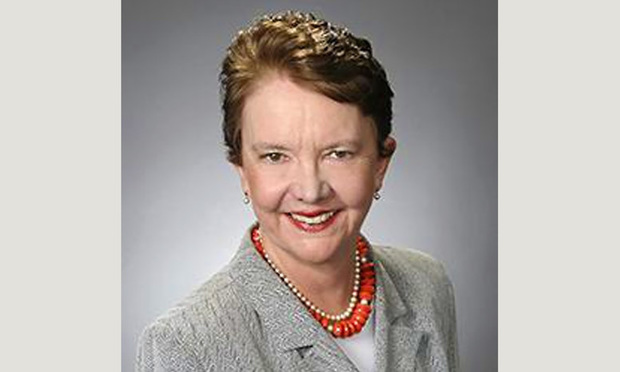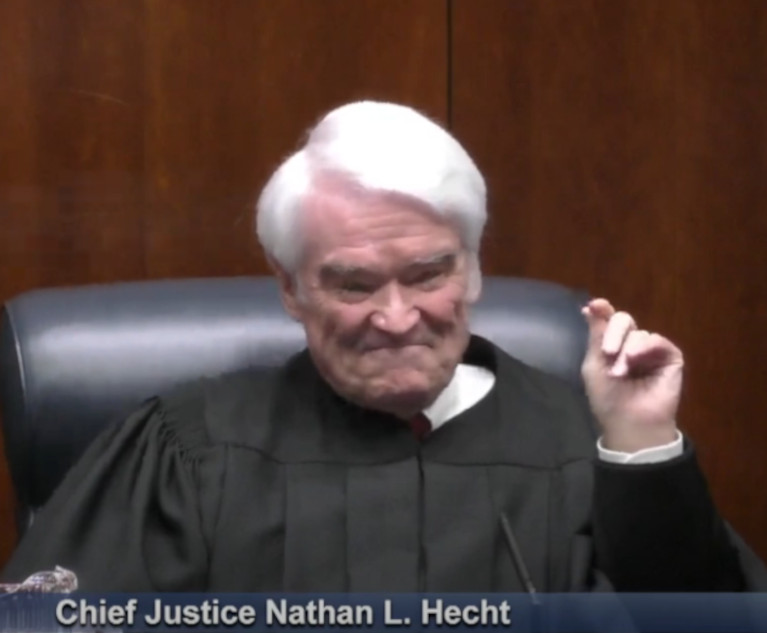Appellate Attorneys Shocked at Justice's Alzheimer's Diagnosis, Resignation
Justice Laura Carter Higley of Houston's First Court of Appeals resigned two weeks after her sons revealed in a guardianship proceeding that she was diagnosed with Alzheimer's disease. Houston attorneys who know Higley are shocked at the news, noting they did not notice any decline in the quality of her work.
November 06, 2019 at 01:25 PM
4 minute read
 Former First Court of Appeals Justice Laura Carter Higley.
Former First Court of Appeals Justice Laura Carter Higley.
The Houston appellate bar is reeling from the news that First Court of Appeals Justice Laura Carter Higley has resigned.
Her resignation came two weeks after her sons, Garrett and Robert Higley, revealed in a court proceeding that the justice was diagnosed with Alzheimer's disease in early October after suffering from a neurocognitive disorder for the past two years.
Justices and staff on the First Court have lost a good judge, according to Clerk of the Court Chris Prine.
"We're all sad to see her retire," he said. "She put in a lot of good years of service."
Higley's sons have asked a probate court to appoint them as their mother's guardian. They claimed in an Oct. 17 application for appointment of a permanent guardian that Laura Higley in 2017 was diagnosed with a neurocognitive disorder, which deteriorated rapidly. On Oct. 9, her doctor diagnosed her with Alzheimer's disease. The justice's memory is failing and she can't recall conversations, nor handle her work duties on the First Court, the sons alleged.
Higley was elected as a Republican to the First Court in 2002, and assumed the bench in 2003. She earned her law degree from the University of Houston Law Center in 1990, and spent her whole legal career before the bench as an attorney with Baker Botts, where she practiced pension law, health care law and executive compensation.
"I have been honored to serve the state of Texas for 17 years as associate justice on the First Court of Appeals," Higley wrote in an Oct. 31 resignation letter, which Gov. Greg Abbott's office received and accepted Monday. "I have written more than 70 opinions a year and served with some very fine judges."
The Alzheimer's diagnosis is a shock to attorneys who practiced before Higley and the justices who sat beside her on the bench.
Former First Court Justice Terry Jennings, who became close friends with Higley after serving alongside her from 2003 to 2018, said that he had lunch with her two or three months ago and she seemed normal. Although he'd noticed she had memory lapses, they did not seem out of the ordinary, so he attributed it to normal aging.
Higley is 72.
Her work did not decline over the past two years, Jennings added. He recalls sitting with her on an appellate panel during a 2018 oral argument where she asked good questions. She authored an excellent opinion in late 2018 that reached the right result by following the law and the Supreme Court's interpretation of the law, he said.
"I enjoyed working with her so much and valued her friendship and valued her as a colleague," Jennings said. "Lawyers viewed her as a judge in the tradition of Sandra Day O'Connor. She was a moderate conservative judge. She was never afraid to rule in favor of a deserving plaintiff or deserving criminal defendant. There are some judges that are very ideological, and she was not one. She was a very reasonable judge."
Appellate litigator Kent Rutter, who practiced before Higley, said she was the First Court's "unsung hero" because of the seriousness with which she handled cases, always studying and following the law wherever it led. Rutter said he didn't notice any changes in the justice over the past two years.
"I do know she was tremendously devoted to her work in the court and she is the kind of person who would want to do her job, regardless of any personal difficulties," said Rutter, partner in Haynes and Boone in Houston. "It doesn't surprise me at all that as long as she believed she could continue with her work on the court, that she would want to do so."
Higley's attorney in the guardianship case, Russell Hall, shareholder in Russell W. Hall & Associates in Bellaire, didn't return a call seeking comment before deadline.
This content has been archived. It is available through our partners, LexisNexis® and Bloomberg Law.
To view this content, please continue to their sites.
Not a Lexis Subscriber?
Subscribe Now
Not a Bloomberg Law Subscriber?
Subscribe Now
NOT FOR REPRINT
© 2025 ALM Global, LLC, All Rights Reserved. Request academic re-use from www.copyright.com. All other uses, submit a request to [email protected]. For more information visit Asset & Logo Licensing.
You Might Like
View All
ExxonMobil Sues California AG Bonta, Environmental Groups for Advanced Recycling 'Smear Campaign'

2 Judges: Meet the New Chief Justice and the GC Who Just Rose to the Bench
3 minute read

Trending Stories
- 1Arbitrators Under Fire for Allegedly Forcing Workers to 'Stay or Pay' Employers
- 2Plaintiff Narrowly Avoids Dismissal Over Lengthy Complaint Filed in Federal Court
- 3Goodwin to Launch Brussels Office With Quinn Emanuel Antitrust Partner
- 4Looking to the Future of the FDA and Its Impact on Drug Regulation in 2025
- 5Pennsylvania Firms Join Partnership Promotion Parade
Who Got The Work
Michael G. Bongiorno, Andrew Scott Dulberg and Elizabeth E. Driscoll from Wilmer Cutler Pickering Hale and Dorr have stepped in to represent Symbotic Inc., an A.I.-enabled technology platform that focuses on increasing supply chain efficiency, and other defendants in a pending shareholder derivative lawsuit. The case, filed Oct. 2 in Massachusetts District Court by the Brown Law Firm on behalf of Stephen Austen, accuses certain officers and directors of misleading investors in regard to Symbotic's potential for margin growth by failing to disclose that the company was not equipped to timely deploy its systems or manage expenses through project delays. The case, assigned to U.S. District Judge Nathaniel M. Gorton, is 1:24-cv-12522, Austen v. Cohen et al.
Who Got The Work
Edmund Polubinski and Marie Killmond of Davis Polk & Wardwell have entered appearances for data platform software development company MongoDB and other defendants in a pending shareholder derivative lawsuit. The action, filed Oct. 7 in New York Southern District Court by the Brown Law Firm, accuses the company's directors and/or officers of falsely expressing confidence in the company’s restructuring of its sales incentive plan and downplaying the severity of decreases in its upfront commitments. The case is 1:24-cv-07594, Roy v. Ittycheria et al.
Who Got The Work
Amy O. Bruchs and Kurt F. Ellison of Michael Best & Friedrich have entered appearances for Epic Systems Corp. in a pending employment discrimination lawsuit. The suit was filed Sept. 7 in Wisconsin Western District Court by Levine Eisberner LLC and Siri & Glimstad on behalf of a project manager who claims that he was wrongfully terminated after applying for a religious exemption to the defendant's COVID-19 vaccine mandate. The case, assigned to U.S. Magistrate Judge Anita Marie Boor, is 3:24-cv-00630, Secker, Nathan v. Epic Systems Corporation.
Who Got The Work
David X. Sullivan, Thomas J. Finn and Gregory A. Hall from McCarter & English have entered appearances for Sunrun Installation Services in a pending civil rights lawsuit. The complaint was filed Sept. 4 in Connecticut District Court by attorney Robert M. Berke on behalf of former employee George Edward Steins, who was arrested and charged with employing an unregistered home improvement salesperson. The complaint alleges that had Sunrun informed the Connecticut Department of Consumer Protection that the plaintiff's employment had ended in 2017 and that he no longer held Sunrun's home improvement contractor license, he would not have been hit with charges, which were dismissed in May 2024. The case, assigned to U.S. District Judge Jeffrey A. Meyer, is 3:24-cv-01423, Steins v. Sunrun, Inc. et al.
Who Got The Work
Greenberg Traurig shareholder Joshua L. Raskin has entered an appearance for boohoo.com UK Ltd. in a pending patent infringement lawsuit. The suit, filed Sept. 3 in Texas Eastern District Court by Rozier Hardt McDonough on behalf of Alto Dynamics, asserts five patents related to an online shopping platform. The case, assigned to U.S. District Judge Rodney Gilstrap, is 2:24-cv-00719, Alto Dynamics, LLC v. boohoo.com UK Limited.
Featured Firms
Law Offices of Gary Martin Hays & Associates, P.C.
(470) 294-1674
Law Offices of Mark E. Salomone
(857) 444-6468
Smith & Hassler
(713) 739-1250






